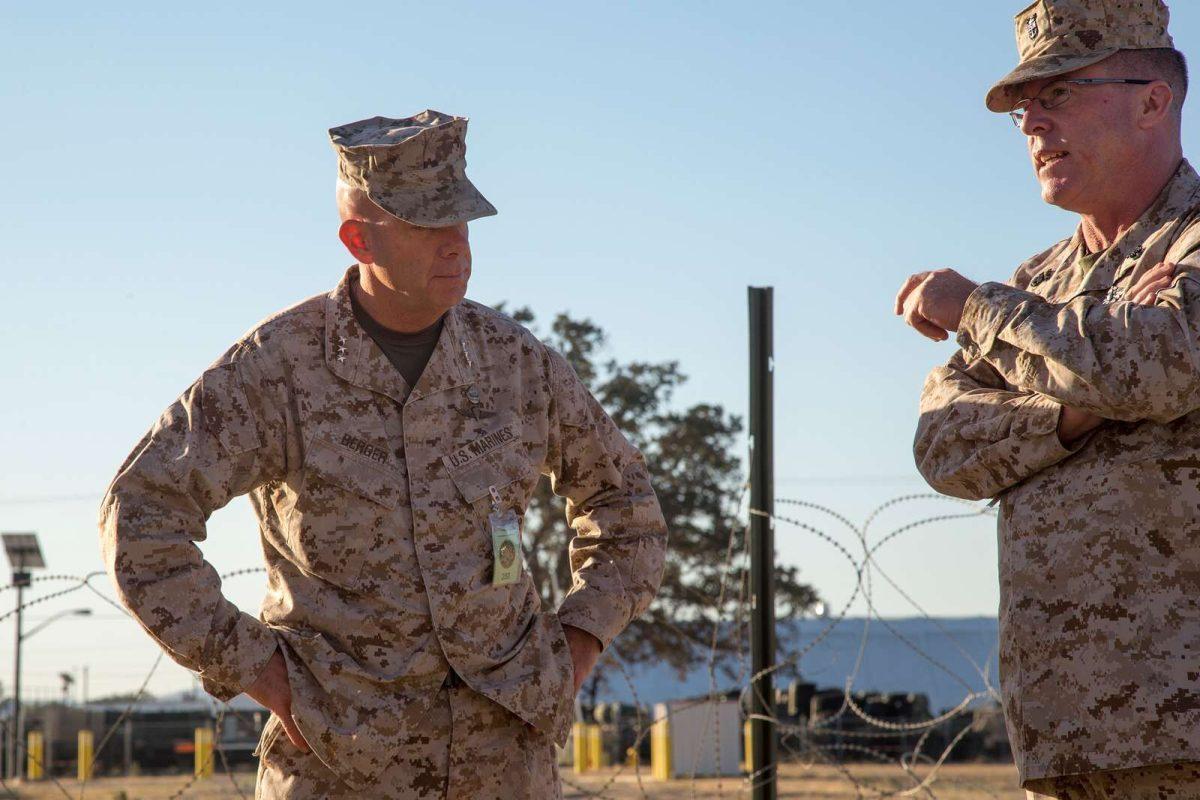Gen. David Berger, the 38th commandant of the U.S. Marine Corps, visited Rudder Auditorium at Texas A&M to give a lecture on the importance of teamwork in the U.S. military, from the individual Marine unit to the joint forces to international cooperation.
Berger was one of the keynote speakers at the Memorial Student Center’s 67th annual Student Conference on National Affairs, or SCONA. This event, running from Feb. 10-12, brought in numerous speakers and had many discussions on national issues.
Before Berger’s address, a short clip was played, explaining the role of the Marine Corps in the U.S. military and what makes a Marine special. Berger talked more to this, citing one specific quality.
“The most foundational element of national security, I would offer, is teamwork,” Berger said. “That’s how we implement our national security, our national strategy. That’s how we protect our national security.”
Berger then said the Marine Corps’ role in the U.S. military makes it distinct.
“We are the nation’s 911 force, not because we picked it, but because it is assigned to us,” Berger said. “We don’t move out as a Marine Corps and win the nation’s wars. That’s not what the Marine Corps does. We are the force that responds quickly, when something bad is happening around the world.”
Berger said teamwork heavily plays into the Marine Corps’ operations, cooperation and training with other countries.
“In my experience this serves two purposes, when we operate with another nation in their military. No. 1, it makes the both of us better and raises both of our competencies and proficiencies,” Berger said. “The second thing is it strengthens the relationships between militaries and between countries, and that’s incredibly powerful.”
Berger came back to this theme of cooperation during the question and answer session when asked about the possibility of continued U.S. deployment in Eastern Europe as tensions rise between Russia and Ukraine.
“Our airpower capabilities, ground forces, surveillance and every element is fitted together as part of NATO to enable NATO to be much stronger,” Berger said. “[But,] there are limits to our national, vital national interests. Our president has already determined what they are and are not.”
Another element of teamwork that Berger spoke about is the standardized training all Marines share that allow them to work together seamlessly.
“We are organized and trained in a common way across Marine units, so that we can pull a unit of Marine units from anywhere, plug it into a task force over here, and they will cooperate together because they have a common base of training,” Berger said.
Berger said teamwork is baked into every Marine, and no Marine ever operates alone.
“If you were to watch that video [at the Kabul airport] again, you would see team after team after team,” Berger said. “If you saw one Marine by themselves, what you can’t see off camera … are two other Marines right next to them. We operate in teams.”
Through his time working with teams, Berger has found a common trait.
“Success of the group is never really determined by a single individual,” Berger said. “One person not pulling their load could bring the whole team down. You never succeed because of one, but you can certainly fail because of one.”
The element of teamwork is especially important to the Marines, often working in smaller groups with less support than other armed forces.
“We are trained to go into an area with nothing more than what’s on our back — satellite radio, a drone,” Berger said. “Every Marine has to be able to pull their own weight; every Marine has to be focused on the team.”
This element of teamwork is also present in allowing the U.S. to operate as a combined Army, Navy, Marine Corps, Air Force and Space Force.
“That’s what gives us such a huge advantage in the United States, is our ability to operate as a joint force,” Berger said. “That’s how we win wars.”
Berger summed up his philosophy of the Marine Corps when answering a question, posed by a Texas A&M cadet named Matthew, who asked what Berger thinks will be the most important development in the military in the future.
“I think some people would say things like hypersonics. They may talk about space capabilities, offensive and defensive. They may talk about cyber, offensive and defensive. And I think they would all have strong arguments,” Berger said. “I think the most consequential thing going forward is the people: the individual soldier, the individual sailor, the individual mariner. It’s not about a piece of technology. It’s how we recruit, how we train them, how we educate them, how we keep them. This has always been the advantage of the United States.”
Berger also spoke to the value of diversity in the Marine Corps as one of its strongest suits.
“The value of diversity in the U.S. military is that we don’t all think alike,” Berger said. “Why is that helpful? Because when you’re up against a really capable threat, a really good adversary, the strengths that different minds put to a problem are going to come at it from different angles; you’re going to get a better solution.”
Berger advised the crowd on how to be a good leader in the here and now. In answer to a question posed by Karina Wilson, a student at Bethel University in St. Paul, Minn., Berger revealed the best advice he ever received.
“It’s so easy to be conservative and safe. Don’t do it,” Berger said.
Also, during his training as a major, Berger said he received the advice, “You’re waiting too long to say something.”
Berger ended his talk with a similar piece of advice.
“Get to know each other and get into the fray,” Berger said.




















